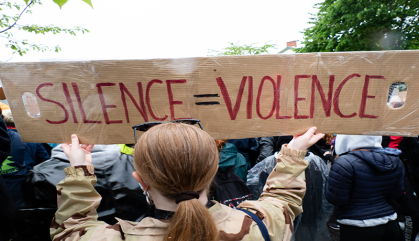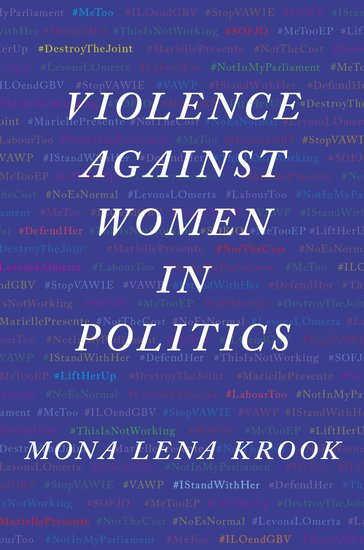As the election nears, galvanized efforts have increased attention, says Rutgers professor

While women have made significant inroads into politics in recent years, their involvement has spurred attacks, intimidation and harassment in many parts of the world, says Mona Lena Krook, a professor of political science at Rutgers University-New Brunswick and author of the new book Violence against Women in Politics.
Krook discusses this global phenomenon, its role in American politics - where the issue has gained growing attention in recent months - and abroad and provides solutions on how this problem can be addressed.
What is violence against women in politics?
It refers to tactics used to silence women's voices in politics as women. Traditional definitions of political violence focus on the use of force and intimidation against political opponents. Violence against women in politics is distinct - and also troubling - because it aims to exclude and empower women as political actors.
The problem has remained hidden until now, largely because many women normalize violence as part of the political game. Others make a strategic decision to remain quiet about gender-based attacks, fearing that speaking out may harm their political careers or affect their parties' electoral fortunes. They may also believe they will be scorned or blamed for allegedly bringing the abuse upon themselves. Despite these barriers, political women around the world have increasingly mobilized to name the problem of violence against women in politics - and, in turn, to take steps to address it.
What are some examples of the different forms of violence?

Violence against women in politics takes many forms: physical, psychological, sexual, economic, and semiotic. Examples of physical violence include the assassination of Brazilian politician Marielle Franco in 2018 and the arrest and ongoing torture of women's rights activists in Saudi Arabia. Online abuse is a common form of psychological violence, involving threats and trolling to force women to leave or reduce their social media engagement. Online attacks often disproportionately target younger women and women of color like Diane Abbott, the first black woman elected to the British parliament.
In the wake of the #MeToo movement, sexual violence gained renewed attention, spurring greater awareness of sexual harassment and assault in many U.S. state legislatures. Economic violence includes vandalism as a form of intimidation, as seen in the defacing of women's campaign posters in the recent Iraqi elections. Semiotic violence, finally, includes creating sexually explicit images of political women to degrade their personal dignity and harm public perceptions of their suitability for political office. More than 100 women lawmakers in the U.S. called on Facebook to be more proactive about removing such digitally manipulated images and videos in August.
Do you foresee this problem increasing as the election nears?
The upcoming election has galvanized efforts to bring greater attention to this issue in American politics. In July, Rep. Alexandria Ocasio-Cortez delivered a widely followed speech on the House floor responding to being called a derogatory name by Rep. Ted Yoho. Around the same time, Time's Up Now launched the #WeHaveHerBack campaign, calling on the news media to avoid sexist and racist stereotypes in coverage of female candidates during the election cycle.
In September, a candidate for the U.S. House posted a threatening photo holding a gun alongside images of three Congresswomen of color. And just last week, Reps. Rashida Tlaib, Alexandria Ocasio-Cortez, Ilhan Omar, Ayanna Pressley and Jackie Speier introduced a House resolution recognizing violence against women in politics as a global phenomenon and supporting women's full and equal participation in political life in both the U.S. and abroad.
What can we do to address this problem?
At the most basic level, addressing violence against women in politics requires raising greater awareness. Women worldwide have played a crucial role in naming this problem - whether as individuals speaking out about their experiences, as groups drafting collective manifestos or as networks drawing attention to violations of women's political and human rights. In response, several countries have revised or passed new laws addressing violence against women in politics, while some parliaments and political parties have established new codes of conduct forbidding bullying and harassment. Women's organizations have helped document this problem, while also initiating solidarity campaigns and providing legal and practical support to enhance women's security in political spaces.






